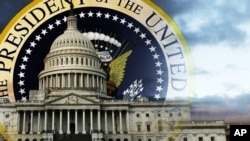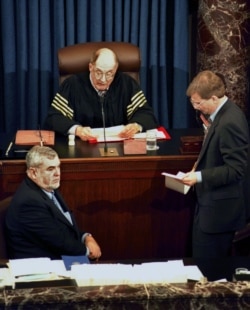In late December, the U.S. House of Representatives voted nearly along party lines to impeach President Donald Trump on abuse of office and obstruction of Congress, making him only the third president in American history to face the threat of removal from office. The historic vote followed a months-long inquiry into allegations that Trump used the power of his office to solicit Ukrainian interference in the 2020 U.S. presidential election and then obstructed Congressional efforts to investigate him.
Why did Congress open an impeachment inquiry into President Trump?
The inquiry started in response to an intelligence community whistleblower complaint that Trump had halted military aid to Ukraine and then asked his Ukrainian counterpart during a July 25 phone call to investigate his likely Democratic opponent, former president Joe Biden, and a debunked theory that Ukraine interfered in the 2016 U.S. election to help Democrat Hillary Clinton against Trump. The intelligence community’s watchdog found the complaint “credible” and subsequent testimony by more than a dozen officials largely corroborated the allegations.
What articles of impeachment did the House approve?
Trump was impeached on two charges in connection with the Ukraine pressure campaign: abuse of power and obstruction of Congress. The first charge stems from Trump’s alleged effort to “solicit” Ukrainian help with his reelection campaign in in 2020 while holding up military aid. The second charge is related to Trump’s subsequent effort to “stonewall” the Congressional inquiry by ordering his administration to defy subpoenas for documents and testimony.
How does the Constitution define an impeachable offense?
The Constitution says impeachment is reserved for officials who commit “treason, bribery or other high crimes and misdemeanors.” What misconduct qualifies as an impeachable offense is ultimately for Congress to decide, but legal scholars say it is not necessary for an official to have committed a crime in order to be impeached.
What is the president's defense?
The president has called the impeachment proceeding a “witch hunt,” repeatedly asserting that his call with the Ukrainian president was "perfect." Republicans say Trump’s directive to his administration not to cooperate with the impeachment is “a legitimate response to an unfair, abusive and partisan process” and does not constitute obstruction of Congress.
What does the American public think about Trump’s impeachment?
Americans appear split over the question of impeachment. Opinion polls tracked by the website FiveThirtyEight show that 47.6 percent support while 46.1 percent don’t support. The divide is much wider by party, with 82.2 percent of Democrats supporting and 88.9 percent of Republicans opposing.
What happens next?
With the president’s impeachment, the Senate will conduct a trial presided over by Supreme Court Justice John Roberts. Democrats recently transmitted the two articles of impeachment to the upper chamber after a delay of several weeks amid a dispute with Republicans over presenting evidence at the proceeding.
Have other presidents been impeached?
Two. Andrew Johnson in 1868 and Bill Clinton in 1998. Both remained in office after they were acquitted in Senate trials. Richard Nixon resigned the presidency in 1974 after Congress began impeachment proceedings against him and Republican congressional leaders told him he would not survive a trial in the Senate.






